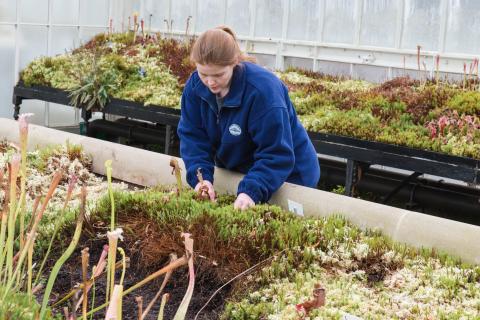Botanists (sometimes known as plant biologists) study all forms of plant life. They have many different job roles as their work can be used in many areas of plant science. If you are fascinated by plants and you are keen on working in science, this could be an ideal job choice for you.
To do this job you will need to have accuracy, attention to detail and strong communication skills.
Botanists may work in:
- Field research, conducting scientific surveys of natural habitats, identifying, recording and monitoring plant species and searching for new species
- Conservation, protecting, managing and enhancing plant life
- Laboratory research on a range of projects, such as discovering how plants convert simple chemical compounds into more complex chemicals or studying how genetic information (DNA) controls plant development
- Lecturing in a university or college
- Managing plant collections, for example as a curator of a botanic garden or keeper of a herbarium.
As a botanist, you could specialise in:
- The study of specific plant groups
- Plant anatomy and physiology
- Biochemistry
- Molecular biology
- Genetics
- Ecology
- Marine botany
- Paleobotany (study of fossilised plant remains)
- Taxonomy (the identification and classification of plants).
Botanists may work with other scientists and technicians, employees and volunteers from conservation organisations and representatives from local and national government and industry.
Working Conditions
Your working hours will vary according to the exact nature of the job.
Botanists working in research and higher education usually work a standard full-time week, Monday to Friday. Additional hours may be required at busy times. Those working in conservation may be required to host open days for the public or work with volunteers at weekends and bank holidays. They may also have to go to evening meetings.
Experimental botanists spend most of their time in laboratories conducting research, while environmental botanists often spend a lot of time in the field making and recording observations. Those working in higher education divide their time between lecture theatres, classrooms, laboratories and offices. Conservation botanists work in offices and laboratories, as well as in the field. Field researchers can spend most of their time outdoors, although this may vary depending on the time of year.
Botanists can work all over the world and may have to cope with difficult climates. Fieldwork can be physically demanding.
A driving licence is often needed for travelling between different places of work.
Salary
Salaries vary with experience, qualifications and between companies, but here's a guide to what you can expect.
£22,000
£30,000
Getting started
There are around 5,000 botanists in the UK and competition for jobs, especially in conservation and fieldwork can be intense.
Many jobs are offered on short-term contracts. Employers include:
- Universities
- Private research organisations and institutes
- Conservation organisations
- Local authorities
- Government agencies
- Nature reserves and country parks
- Botanical gardens and museums
- Food and pharmaceutical companies.
For most botanist jobs you will need a degree in a relevant subject.
Competition for jobs can be strong, especially in fieldwork and conservation, so it helps to have volunteering experience with relevant organisations before applying for your first job. As a volunteer, you may be trained in areas such as conservation techniques and plant identification.
What experienced workers can do
- Be able to keep accurate records of research
- Good communication skills to convey technical information to people with little or no scientific knowledge
- Leadership skills
- Research skills - the ability to analyse, interpret and report on data
- A thorough knowledge of science, particularly biology and chemistry
- Problem-solving ability.
Personal qualities you should have
- Have an interest in science and plants
- Have an interest in a particular sector where botany is important, such as conservation, teaching, research, food or pharmaceuticals
- Accuracy and attention to detail
- Methodical approach
- Patience, perseverance and good concentration
- Enjoy working in a team and on his or her own initiative.
Next steps
Career progression for conservation and field research workers usually involves taking on more responsibility for projects and advising or managing others.
In universities, botanists may be promoted from researcher to lecturer, then to higher grades, such as senior lecturer, principal lecturer, reader, professor or head of department.
There may be an established career structure in industries, with experienced botanists being promoted to more senior positions.
Some botanists become self-employed and work as freelance consultants.
Botanists working in conservation, fieldwork or for multinational companies may have the opportunity to work overseas.
Useful links
British Association of Landscape Industries
British International Golf Greenkeepers Association
Greenkeepers Training Committee
